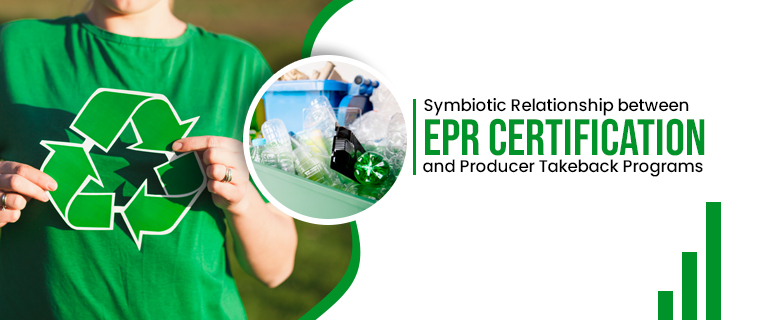Symbiotic Relationship between EPR Certification and Producer Takeback Programs
As the global community intensifies its efforts to address environmental concerns, businesses are under increasing pressure to adopt sustainable practices. In this pursuit, the synergy between Extended Producer Responsibility (EPR) Certification and Producer Takeback Programs emerges as a powerful force in shaping a circular economy. Let's unravel the interconnection between these two initiatives and explore how they contribute to a more sustainable and responsible business landscape.
Extended Producer Responsibility (EPR) Certification: A Commitment to Sustainability
At its core, EPR is a paradigm shift in the way businesses approach their products' lifecycle. EPR Certification is a formal acknowledgment of a company's commitment to managing the environmental impact of its products, extending from production to end-of-life disposal. While EPR places the onus on producers to manage their products responsibly, it dovetails seamlessly with the concept of Producer Takeback Programs.
Producer Takeback Programs: Closing the Loop of Responsibility
Producer Takeback Programs are initiatives where manufacturers take responsibility for the collection and proper disposal of their products after consumers are done using them. These programs aim to create a closed loop, where products are recycled or safely disposed of, minimizing environmental impact.
Read also this -: Navigating the Exemptions of LMPC CertificationThe Interconnected Relationship:
1. End-of-Life Responsibility: EPR Certification emphasizes the responsibility of producers for the entire lifecycle of their products, aligning seamlessly with Producer Takeback Programs that specifically address the end-of-life stage.
2. Waste Reduction: The integration of EPR and Producer Takeback Programs promotes a circular economy by minimizing waste generation. Products are collected, recycled, or repurposed, reducing the need for additional raw materials and lowering the overall environmental footprint.
3. Transparency and Accountability: Both EPR Certification and Producer Takeback Programs require a high level of transparency and accountability. Companies with EPR Certification often find it natural to implement takeback programs, as they are already committed to transparent reporting on their environmental performance.
4. Consumer Trust: The combination of EPR Certification and Takeback Programs enhances consumer trust. When customers witness a brand actively involved in the responsible disposal of its products, it fosters a positive perception, building loyalty and attracting environmentally conscious consumers.
Benefits of the Symbiotic Relationship:
1. Environmental Impact Reduction: Together, EPR and Takeback Programs significantly reduce the environmental impact of products, promoting a more sustainable and circular approach to production and consumption.
2. Regulatory Compliance: EPR Certification helps businesses stay compliant with environmental regulations, and the integration with Takeback Programs aligns with various waste management directives, ensuring comprehensive adherence.
Read also this -: Quick & Hassle-free LMPC License for Importers3. Innovation and Product Design: The collaboration between EPR Certification and Takeback Programs stimulates innovation in product design. Companies are incentivized to create products that are easier to recycle or repurpose, contributing to a more sustainable product lifecycle.
In conclusion, the symbiotic relationship between EPR Certification and Producer Takeback Programs exemplifies a powerful strategy for businesses committed to sustainability. By closing the loop of responsibility from production to disposal, companies can not only meet regulatory requirements but also contribute meaningfully to the global movement towards a circular economy. Embracing these initiatives is not just about compliance; it's about being a proactive steward of the environment and setting the standard for responsible business practices.



Comments
Post a Comment